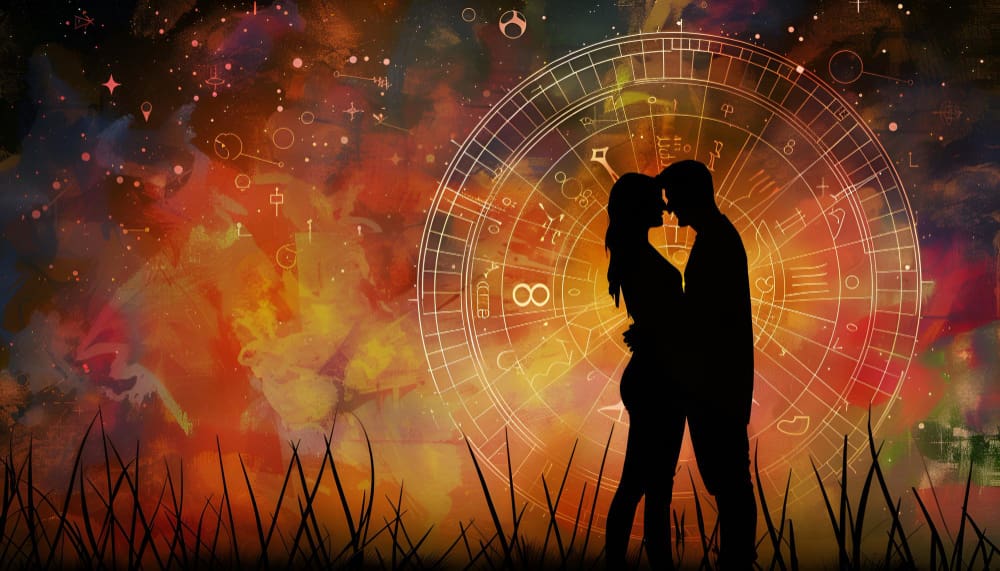Mangal Dosha, also known as Kuja Dosha, is one of the most discussed and often feared planetary combinations in Vedic astrology, primarily affecting an individual’s marital life. This astrological condition occurs when the planet Mars—known as Mangal or Kuja—is placed in specific, sensitive houses within a person’s birth chart, namely the 1st, 4th, 7th, 8th, or 12th house from the Ascendant. It is believed that the fiery, aggressive, and disruptive energy of Mars in these key areas, which govern the self, domestic happiness, partnership, and intimacy, can create significant conflict, tension, separation, or even health challenges for a spouse, thereby threatening the harmony and longevity of a marriage.
Understanding Mars: The Fiery Planet of Action
In the celestial cabinet of Vedic astrology, Mars is the commander-in-chief. It represents raw energy, action, courage, passion, ambition, and aggression. Like a soldier, Mars is disciplined and protective but can also be impulsive, confrontational, and destructive if its energy is not channeled constructively.
Mars is classified as a natural malefic, meaning its inherent nature can cause strife and struggle. Its placement in a birth chart, or Kundali, is therefore of paramount importance. When this potent energy is positioned in a house that requires softness, diplomacy, and peace, it can act like a bull in a china shop, disrupting the delicate balance required for a healthy relationship.
What Exactly is Mangal Dosha?
A “Dosha” in Sanskrit translates to a flaw or blemish. Mangal Dosha, therefore, signifies a flaw caused by the planet Mars. The condition is determined by the position of Mars relative to the Ascendant (Lagna), the Moon (Chandra), and sometimes Venus (Shukra). The placement from the Ascendant is considered the most significant.
The core principle is that Mars casts its influence not only on the house it occupies but also on other houses through its aspects. The specific houses involved in this Dosha are critical to relational stability, and Mars’s presence here injects volatility where it is least welcome.
Mars in the 1st House (The Ascendant)
The 1st house represents the self, personality, temperament, and physical body. When Mars is located here, it directly infuses the native’s personality with its fiery qualities. These individuals can be headstrong, assertive, short-tempered, and highly independent.
In a marriage, this can manifest as a dominating nature and an inability to compromise, leading to frequent ego clashes and power struggles with their partner. While this placement bestows immense energy and drive, it can make relationship dynamics challenging without conscious self-awareness.
Mars in the 4th House (House of Home and Happiness)
The 4th house governs domestic life, mother, property, vehicles, and inner emotional peace (Sukh). Placing the warrior planet Mars in this house of domestic tranquility is inherently disruptive. It can create a tense and argumentative atmosphere at home.
Individuals with this placement may find it difficult to experience contentment and peace within their family life. This can lead to frequent disputes, a lack of emotional nourishment from the relationship, and a home environment that feels more like a battlefield than a sanctuary.
Mars in the 7th House (House of Marriage and Partnership)
This is the most direct and potent placement for Mangal Dosha. The 7th house is the primary house of marriage, legal partnerships, and the spouse. With Mars positioned here, its aggressive energy is aimed squarely at the relationship and the partner.
This can result in open conflicts, severe disagreements, and a constant battle for supremacy. It can also indicate a partner who is aggressive or, conversely, one who suffers due to the native’s assertiveness. The risk of separation and divorce is considered highest with this placement if other mitigating factors are not present.
Mars in the 8th House (House of Longevity and Secrets)
The 8th house is a complex and intense house governing longevity, marital ties (Mangalya Sthana), inheritance, secrets, and sudden transformations. Mars here is considered particularly troublesome as it can create sudden, unexpected crises within the marriage.
This placement is traditionally linked to potential health issues or accidents for the spouse and can cause deep-seated conflicts related to joint finances, in-laws, or sexual compatibility. The confrontational energy of Mars in this house of hidden things can bring painful secrets to the surface in a destructive manner.
Mars in the 12th House (House of Loss and Bed Pleasures)
The 12th house rules over losses, expenses, isolation, foreign lands, and “bed pleasures” or sexual intimacy. Mars in this house can create frustrations and dissatisfaction in the physical aspect of the marriage. Its fiery nature can lead to aggressive or incompatible sexual demands.
This can manifest as a lack of fulfillment, leading to hidden resentments that erode the relationship from within. It can also signify financial losses that put a severe strain on the marital bond.
It is worth noting that some astrological traditions, particularly in South India, also consider Mars in the 2nd house (family, speech, and finance) as a cause for Mangal Dosha, as its placement here can lead to harsh speech and family conflicts.
The Nuances: Is Mangal Dosha an Unbreakable Curse?
The mere presence of Mars in one of these houses does not automatically condemn a marriage. Vedic astrology is a science of complexities and counterbalances. The severity of the Dosha is greatly influenced by other factors in the chart, and in many cases, it is considered nullified or cancelled (a concept known as Dosha Bhanga).
An experienced astrologer will never make a judgment based on this single placement. They will analyze the chart holistically to see if any cancellations apply, which is often the case.
Factors that Mitigate or Cancel the Dosha
- Matching Horoscopes: The most famous remedy is for an individual with Mangal Dosha to marry another person who also has Mangal Dosha. The logic is that the two similar energies balance or “cancel” each other out, as both partners possess a similar temperament and can understand each other’s intensity.
- Strong Benefic Aspects: If a powerful and benevolent planet like Jupiter (Guru) aspects Mars or the house it occupies, its wise and expansive energy can significantly soothe Mars’s malefic effects. Jupiter’s grace can temper aggression with wisdom.
- Placement in Own or Exalted Signs: If Mars is in Aries or Scorpio (its own signs) or Capricorn (its exalted sign), it is considered strong and dignified. In these positions, Mars is more controlled and channels its energy constructively, greatly reducing the negative impact of the Dosha.
- The Age Factor: Many classical astrologers believe the potency of Mangal Dosha diminishes significantly after the age of 28. This is the age when Mars matures, and the individual has likely learned to manage their aggressive impulses with more wisdom and life experience.
Astrological Remedies for Harmonizing Mars’s Energy
For those whose charts show a prominent and unafflicted Mangal Dosha, Vedic tradition offers several remedies. These are not magical fixes but rather tools designed to propitiate the planetary energy and cultivate personal qualities that counteract its negative effects.
Pre-Marital Rituals
The most crucial step is thorough horoscope matching (Kundali Milan) before marriage. If a significant Dosha is found, a symbolic ceremony called Kumbh Vivah may be performed. In this ritual, the person with the Dosha is first “married” to a Peepal tree, a banana tree, or a clay pot, which symbolically absorbs the first and most intense shock of the Dosha, thereby protecting the future human spouse.
Lifestyle and Spiritual Practices
The most powerful remedies are often behavioral and spiritual. Regular worship of deities who rule Mars, such as Lord Hanuman or Kartikeya (Murugan), is highly recommended. Chanting the Hanuman Chalisa on Tuesdays is a widely practiced remedy to gain strength and control over impulsive energies.
Fasting on Tuesdays and donating red-colored items—such as red lentils (masoor dal), red cloth, or sweets made of jaggery—to the needy are also considered effective ways to pacify the planet.
Ultimately, the best remedy is self-awareness. Cultivating patience, practicing anger management techniques, fostering open communication, and consciously choosing empathy over aggression are the most practical ways to manage the Martian energy in a relationship.
Conclusion: A Tool for Awareness, Not Fear
Mangal Dosha is a significant astrological factor that highlights potential conflict points in a marriage. It points to a powerful, fiery energy that, if left unchecked, can disrupt relational harmony. However, it is far from a definitive curse. Its actual impact is deeply nuanced, depending on the entire configuration of the birth chart, including planetary strengths, aspects, and potential cancellations.
Rather than a source of fear, understanding this placement should be seen as a powerful tool for self-knowledge. It provides a cosmic roadmap, alerting an individual to their innate tendencies so they can navigate their relationships with greater consciousness, patience, and wisdom. With proper understanding and a proactive approach, the intense energy of Mars can be transformed from a source of conflict into a wellspring of passion, courage, and protection for a lasting partnership.








